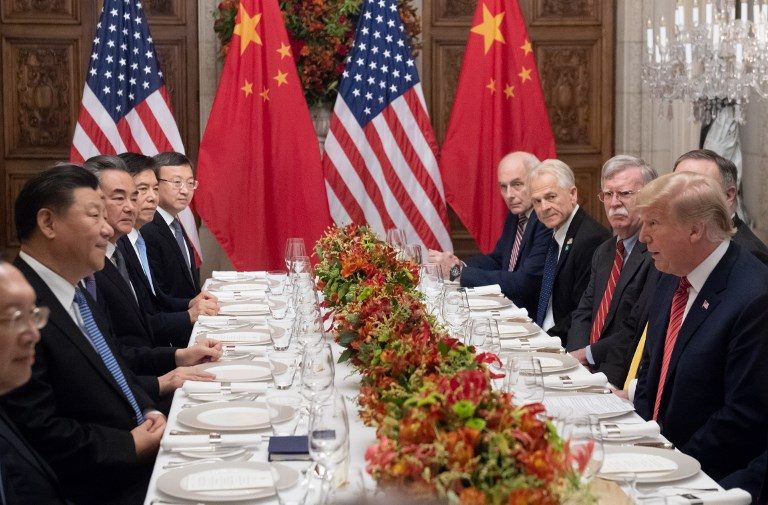SUMMARY
This is AI generated summarization, which may have errors. For context, always refer to the full article.

BUENOS AIRES, Argentina – A dinner meeting on Saturday, December 1, between United States (US) President Donald Trump and his Chinese counterpart Xi Jinping to discuss their growing trade war went “very well,” White House top economic advisor Larry Kudlow said.
Kudlow’s comment to journalists, as Trump and his delegation were about to take off for Washington from Buenos Aires, was the first public reaction from the high-stakes dinner lasting more than two hours.
White House spokeswoman Sarah Sanders said she expected to release a statement soon. There was no immediate word from China’s government.
Trump and Xi, who were in the Argentinian capital over the last two days for a summit of G20 countries, had gone into the meeting in a bid to pull the world’s top two economies from the brink of a full-fledged trade war. (READ: G20 opens under assault from Trump on collective action)
Both leaders expressed optimism as they and top aides sat down at a long hotel table adorned with flowers.
“We will probably end up ending up getting something that will be good for China and the United States,” Trump said.
Xi stated that they shared tremendous responsibility to find a solution. “Only with cooperation between us can we serve the interest of both peace and prosperity,” he said.
The meeting, featuring a menu of sirloin steak, caramel rolled pancakes, and Argentinian wine, went on longer than scheduled. And while it may have been tacked on to the end of two days of G20 diplomacy, it was in many ways the main event of the weekend.
Trump has already imposed tariffs on more than $250 billion in Chinese goods – about half of the total imported into the US each year – in an attempt to pressure Beijing to change its trade rules.
Duties of 10% currently on most of those goods are set to rise on January 1, 2019 to a whopping 25% if a deal isn’t reached.
And that’s not all.
As Kudlow said in Washington ahead of the dinner: “If things don’t work out in this US-China summit meeting, he will invoke some $267 billion in additional tariffs.”
With US-Chinese disagreements on Trump’s demands for better market access and intellectual property protections so profound, any real breakthrough was considered unlikely.
But financial markets, spooked by the potential impact on the world economy, hoped that at least some kind of truce could be declared. (READ: [ANALYSIS] G20 showdown? U.S. calls out China)
German Chancellor Angela Merkel, also attending the G20, spoke for many when she urged progress.
“We all realize that we are indirectly influenced by the fact that Sino-American economic relations are not running as smoothly as a world order needs,” she said.
Personal chemistry factor
Both sides certainly came prepared for serious discussion. The White House released the names of the two delegations, totaling 20 people in addition to the two leaders.
On the US side, these included advisers such as Kudlow and Treasury Secretary Steven Mnuchin, who are widely seen as wanting to cut a deal, but also hawkish advisers like Peter Navarro and US Trade Representative Robert Lighthizer.
Navarro’s inclusion in particular was a surprise, as he has harshly criticized China, accusing its leadership of duplicity. However, keen White House watchers noted that Trump was flanked at the table by Mnuchin and his secretary of state, Mike Pompeo.
Trump, as often in his diplomatic dealings, appears to consider his personal chemistry with Xi the most important factor in the success of the negotiations.
He has prided himself on building a good relationship with the Chinese leader, even though he acknowledges it may have trouble surviving the growing crisis.
“He may not be a friend of mine anymore, but I think he probably respects me,” Trump said in September.
At the dinner, however, he was more upbeat, saying that his ties to Xi were “a very primary reason” for considering a deal possible.
Beyond trade, Washington and Beijing find themselves increasingly entangled on hard-to-resolve issues.
They include attempts to secure the denuclearization of North Korea and China’s increasingly self-confident expansion of military power, especially in the South China Sea.
A successful dinner date with Xi would certainly help Trump’s mood on the long flight home given his generally rocky G20 experience, where he faced difficult questions over relations with Saudi Prince Mohammed bin Salman and his abrupt cancellation of a meeting with Russian President Vladimir Putin. – Rappler.com
Add a comment
How does this make you feel?
There are no comments yet. Add your comment to start the conversation.